The Life &
Career
of Leonard Rossiter
Loot
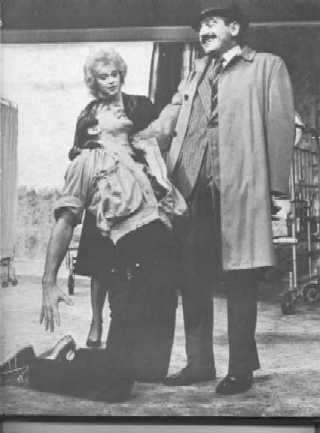
Written by Joe Orton
Directed by Jonathan
Lynn
(both productions)
March 8th - May 5th 1984
Ambassador's Theatre,
London
September 1984 -
January
1985
Lyric Theatre, London
Leonard Rossiter as
Inspector
Truscott (pictured)
Gemma Craven as Nurse Fay
(pictured)
Patrick O'Connell as
McLeavy
Neil Pearson as Hal
(pictured)
Paul McGann as Dennis
(Ambassador
production)
David John as Dennis
(Lyric
production)
John Channell Mills as
Meadows
"In a world run by
fools,
the writer can only chronicle the doings of fools or their victims. And
because the world is a cruel and heartless place, he will be accused of
not taking his subject seriously... But laughter is a serious business,
and comedy a weapon more dangerous than tragedy. Which is why tyrants
treat
it with caution...."
- Joe Orton
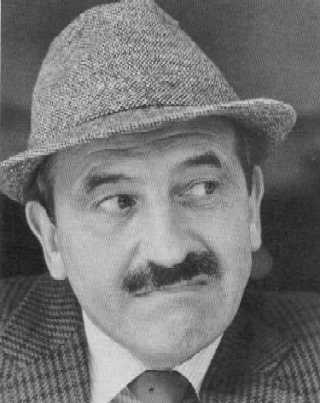
"Reading isn't an
occupation
we encourage among police officers. We try to keep the paperwork down
to
a minimum." - Inspector Truscott, Loot (Act II).
Fay: The British
police
force used to be run by men of integrity.
Truscott: That is a
mistake
that has been rectified.
On
March
8th, 1984, Leonard Rossiter embarked on the first of two runs of Joe
Orton's
play Loot, the first at the Ambassador's Theatre in London, and later
moving
to the city's Lyric Theatre. He had just finished recording a sitcom
for
ITV, Tripper's Day, and a TV play, The Life and Death of King John, for
the BBC. He was looking forward to 'treading the boards' again in this,
his favourite medium, theatre. It was to be another leading role, and
another
success for Leonard Rossiter in the West End. With less than a month to
his fifty-eighth birthday, no-one would have thought it would be his
last
ever performance.
Loot
is a black comedy and a satire on arbitrary authority. It turns public
institutions (notably the police) and social taboos (death and
religion)
into ironic farce, and with blistering effect. Premiered on February
1st
1965 at the Arts Theatre, Cambridge, the play's desire was to shock
-
and it did so successfully, albeit at the expense of the critics, who
reviled
"Mr. Orton's repetitive and nasty sense of humour". Re-written and
revived
at the University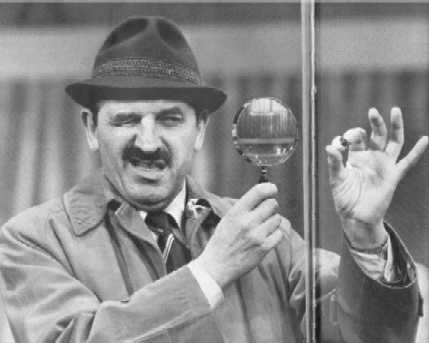 Theatre, Manchester in April 1966, and starring Kenneth Williams as
Truscott,
the play became a critical success, even winning the Evening Standard's
Best Play of 1966 award after its transfer to the West End at the
Jeanetta
Cochrane Theatre in September of that year. In today's society,
however,
with stories of death, greed and irreverance to religion in every
newspaper
and TV drama, the play has less of a social impact, but remains a
masterpiece
of irony, paradox, sharp one-liners, confused morals and scathing
satire.
Theatre, Manchester in April 1966, and starring Kenneth Williams as
Truscott,
the play became a critical success, even winning the Evening Standard's
Best Play of 1966 award after its transfer to the West End at the
Jeanetta
Cochrane Theatre in September of that year. In today's society,
however,
with stories of death, greed and irreverance to religion in every
newspaper
and TV drama, the play has less of a social impact, but remains a
masterpiece
of irony, paradox, sharp one-liners, confused morals and scathing
satire.
In a
semi-detached house in suburban London, a death has occurred in the
McLeavy
household. Mrs. McLeavy lies embalmed in her coffin, lying in state in
her Women's Voluntary Service uniform. While her widow, Mr. McLeavy,
mourns
for his late wife, their son Hal is out robbing the local bank -
ironically
located next to the funeral parlour - with his friend Dennis, who also
happens to be the undertaker of said parlour. With the police in hot
pursuit,
they decide to hide their ill-gotten gains in the old lady's coffin. A
problem arises, however, when they discover there is not enough room
for
both contents. The corpse is shamelessly removed to various parts of
the
house, and finally to the living-room cupboard. A representative from
the
Metropolitan Water Board - really Inspector Truscott in disguise -
enters
the house, but is as corrupt as he is wily. Meanwhile, the McLeavy's
private
Irish nurse, Fay, is comforting the widower, while secretly planning on
turning him into husband number eight. She is a serial killer, who
murders
the wives of wealthy men, marries the widows, then murders them to
inherit
their money. It is she who has poisoned Mrs. McLeavy. It is the gradual
emergence of the body, limb by limb, from the wardrobe (not to mention
the corpse's glass eye rolling about the floor), and the portrayal of
police
brutality and hypocrisy that turns the play into a compelling and yet
wickedly
disturbing depiction of the blatant power of greed over morals.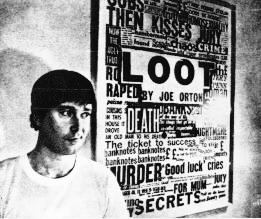
Loot
was one of several black farces written by Joe Orton in his tragically
short career. Born in Leicester on New Year's Day 1933, John Kingsley
Orton
became interested in acting and joined several amateur dramatic
societies.
He gained entry to RADA (Royal Academy of Dramatic Arts), much to the
annoyance
of his teacher, who thought he was awful, "She had no taste", said Joe
in a 1967 interview. He found himself stagnating at RADA, however, and
left after two years. After joining repertory theatre, and embarking on
a short-lived, unhappy, marriage, Joe took up writing plays. At the age
of 18, Joe had met Kenneth Halliwell at RADA, and they became lovers,
living
together in Islington, North London. Joe Orton quickly made a name for
himself in playwriting circles, and his works Entertaining Mr. Sloane,
The Ruffian On The Stair, and Loot became a huge success, and were even
made into radio and TV productions. His lover, however, remained a
struggling,
unpublished writer. On August 9th 1967, Kenneth Halliwell murdered Joe
Orton by repeated hammer blows to the head, and then killed himself
with
an overdose of tablets. (The life story of Joe Orton was made into a
film
in 1987 entitled Prick Up Your Ears. It was written by Alan Bennett,
based
on the biography by John Lahr, and featured Gary Oldman as Joe and
Alfred
Molina as Kenneth Halliwell).
In
November
1983, the small, compact Ambassadors Theatre in West St., London, SW2,
became home to The Little Theatre Of Comedy, with founder members
inclding
such actors as John Alderton, Richard Briers, Judi Dench, Eric Sykes,
and
Leonard Rossiter. It was here, on March 8th 1984 that the theatre's
production
of Joe Orton's Loot opened, starring Leonard, Gemma Craven, Paul McGann
and Neil Pearson. But director Jonathan Lynn admits that Leonard wasn't
the frist choice to play Truscott: "He wanted to play it originally,
but
Charles Marowitz, the original director, declined. Leonard was very
angry
about that. He was determind to prove that he was the best person on
the
planet to play the role - which he was."
As if
to put the audience in the mood for what was to come, the theatre was
draped
in black, and there were wreaths and messages of condolence in the
foyer.
Despite the opening night horror of the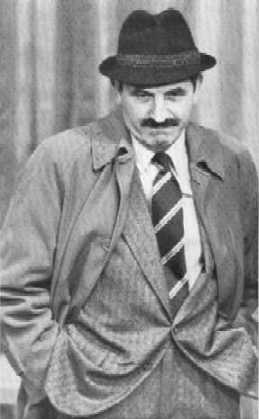 corpse
accidentally being dropped
off the front of the stage by Paul McGann (to which Leonard
nonchalantly
ad-libbed "Well, go on boy, ask for it back!"), the play received very
favourable reviews, and audiences were packed for every performance
until
it closed on May 5th. The production then transferred to the Lyric
Theatre
where it stayed until the play closed in the January of 1985. The cast
remained the same, with the exception of Paul McGann, who was replaced
by David John. Leonard's perfect portrayal of the psychopathic,
unpredictable
Inspector Truscott earned him a nomination for Comedy Performance of
the
Year in the 1984 Laurence Olivier Awards (see the link at the foot of
the
page), presented by The Society of West End Theatre. But it was to be
the
performance of Loot on the evening of October 5th 1984 that its cast
will
remember for the rest of their lives.
corpse
accidentally being dropped
off the front of the stage by Paul McGann (to which Leonard
nonchalantly
ad-libbed "Well, go on boy, ask for it back!"), the play received very
favourable reviews, and audiences were packed for every performance
until
it closed on May 5th. The production then transferred to the Lyric
Theatre
where it stayed until the play closed in the January of 1985. The cast
remained the same, with the exception of Paul McGann, who was replaced
by David John. Leonard's perfect portrayal of the psychopathic,
unpredictable
Inspector Truscott earned him a nomination for Comedy Performance of
the
Year in the 1984 Laurence Olivier Awards (see the link at the foot of
the
page), presented by The Society of West End Theatre. But it was to be
the
performance of Loot on the evening of October 5th 1984 that its cast
will
remember for the rest of their lives.
In the
previous week, Leonard Rossiter had suffered some mild chest pains,
and,
despite very rarely being ill, had undergone a series of tests at the
Brompton
Hospital. When cast member David John enquired about the tests, Leonard
replied: "He gave me a check-over and I'm as fit as a fiddle." On the
fateful
Friday evening, the performance was a sell-out and even the
standing-room-only
area of the auditorium was full. Co-star Neil Pearson remembers: "He'd
come in, and wandered about in the wings before the show. He wasn't on
first, but he always did that, just to get the 'feel of the house'. The
show started. We did the first scene. Leonard came on for the second
scene,
then off he went." Leonard and David John exchanged a few words in the
wings, then Leonard returned to his dressing room, while David went on
stage for his next scene. It was after David had returned to his own
dressing
room that he realised something was terribly wrong. It was just twenty
minutes into the performance when a backstage tannoy call had been made
for Leonard's next appearance, something which was never required, for
Leonard was famous for his immaculate professionalism. David went and
listened
to the dialogue on stage - Gemma Craven was improvising after Leonard
had
missed his cue. Shortly after, Neil Pearson was heard to say: "I'm
sorry,
ladies and gentlemen, we have a slight problem. We're going to bring
the
curtain down but we'll be back with you as soon as possible."
Leonard's
understudy, John Channell Mills, ran to Leonard's dressing room, but
found
the door locked. He forced it open and found Leonard slumped in an
armchair,
unconscious and with a pallid, grey, complexion. The rest of the cast
arrived
soon after, and Gemma Craven felt his pulse, but replied: "He's dead."
David John tried heart massage and artificial respiration, but to no
avail:
"I actually thought I had got Leonard breathing", David recalls. "The
air
was going in and out as though he was alive. There was hope. I just
kept
going, looking at his face, thinking 'Come on, Leonard, pull through,
you
can do it.'" A call for a doctor was made on-stage and two doctors
rushed
to Leonard's dressing room. A third member of the audience also rushed
backstage - it was the actress Frances de la Tour, his co-star in
Rising
Damp. "I was there at the theatre, quite by chance, on the night he
died.",
Frances recalls. "I was going to go backstage at the end of the show to
congratulate him - instead I went backstage after only twenty minutes
into
the show - to see him die."
An
ambulance
soon arrived and rushed Leonard to the Middlesex Hospital, but it was
clear
he was already dead. Gillian Raine, Leonard's wife, arrived at the
theatre,
then followed the ambulance to the hospital. A flurry of journalists
and
photographers had by now descended on the Lyric Theatre, but the cast
had
had to resume their roles and finish the evening's performance. David
John
remembers the rest of the dreadful evening: "All I could think of was
Leonard.
Even though I knew he was gone, somehow there was a faint glimmer of
hope.
Meanwhile, I was having to perform a black comedy about death, coffins
and funerals which had a total disrespect for the dead. I shall never
know,
to this day, how I, or the others, got through the performance. As the
curtain came down, we were told Leonard was dead." Leonard Rossiter had
died of hypertrophic cardiomyopathy, a congenital disease of the heart
muscles. He was fifty-seven years old.
See also: Biography
and Personal
Remembrances.
Leonard's Role
Remembered:
"Leonard... with a mad
gleam
in his eye and shark-like affability... had the Inspector's
unpredictable
and psychopathic measure perfectly." - Robert Tanitch.
"Before I met Leonard I
heard
that he was keen to cast me in Loot by Joe Orton. Leonard was very,
very
scary, for two reasons: First, because he was, by temperament, very
snappy,
a perfectionist, and second because he was brilliant." "Leonard was a
great
mechanic of comedy. He knew the nuts and bolts of it. He knew how it
worked.
He knew scientifically how to elicit a laugh from the audience." - Neil
Pearson, co-star.
"As an exponent of
black
humour, there was none better. I always thought what a wonderful
Truscott
he'd make in 'Loot', but it wasn't until recently that I realised it
was
'Loot' he was doing when he died. But he must have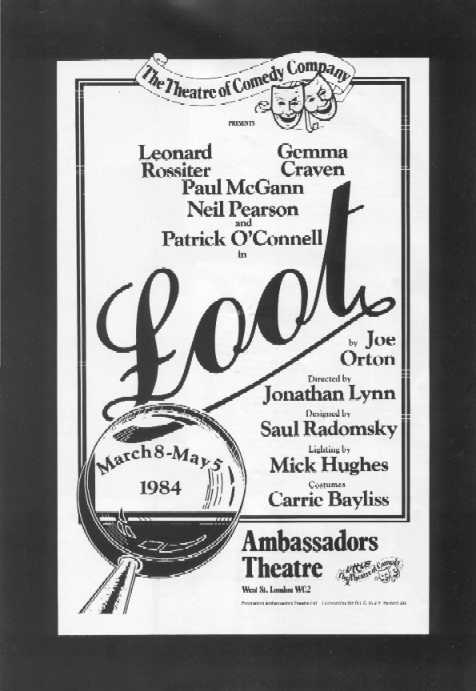 done it brilliantly.
It was right up his street." - Alan Simpson, writer.
done it brilliantly.
It was right up his street." - Alan Simpson, writer.
"The irony of the whole
thing
is that the play was about moving a dead body about on stage, form the
cupboard back into the coffin, while the two boys had done a bank
robbery
and are hiding the money in the coffin." "This particular night, we
started
the show and Leonard made his first entrance. He went off and Neil
Pearson
and myself were left onstage to carry on with the scene. We get to the
end of the scene where Truscott bursts in from the garden and
interrupts
our conversation. But there was no sign of Leonard, so they brought the
curtain down. They said 'We can't find Leonard!' I went round to his
dressing
room, because ours were next door to each other, and I went straight
in.
Leonard was just sitting there, very calmly in his armchair, holding
his
Truscott pipe. And we realised that he had died. It was an amazing way
for him to go - in his beloved theatre, and doing what must have been
one
of his favourite plays. Playing, I think, a character which seemed to
have
been written for him. He was very, very sadly missed." - Gemma Craven,
co-star.
"His performance had to
be
perfect, down to the tiniest of details. He was ruthless with himself.
There was no room for a laugh that didn't deliver, or a mis-timed
moment.
As a result, I think he had a right to expect the best from everybody
else.
When he got it he was wonderful. When he didn't he was intolerant." -
Jonathan
Lynn, director.
"It was a perfect
match.
The awful thing is that Leonard died during a performance. It had the
most
fantastic reviews. He was brilliant in it. It was the perfect use of
his
quirkiness." - Ray Cooney, playwright.
"Things that make me
laugh
are black jokes, which some people find distasteful. I like the story
about
Arthur Lucan, who was of course 'Old Mother Riley'. He'd been doing
pantomime
for about ten weeks, with the audience full of kids screaming his name.
He goes off to his dressing room. Then there's a call for him, and he
doesn't
answer. The theatre manager has to go onstage and break the news. And
he
says 'Please could I have your attention? Kiddies, shush please. I have
some very sad news. Old Mother Riley is dead.' And someone from the
back
shouts 'Oh no, she isn't!' "- Leonard Rossiter, Live From Two, 1980,
four
years before the same fate befell Leonard himself.
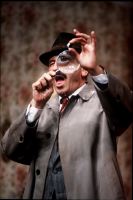
Critical Reviews:
"That sinister seediness
in which Leonard Rossiter so excels has seldom been seen to better
effect
than as the insidious Inspector Truscott."
- Jack Tinker, Daily
Mail.
"Rossiter presents us
with
a character who is both stupid and vicious at the same time; and his
superb
comic achievement is to show the lurking insanity inside a
community-belt
normality." - Michael Billington, The Guardian.
"The performance can
also
be viewed as a brilliant, versatile demonstration of the double-take
technique.
Mr. Rossiter is gorgeously and inimitably funny from start to finish."
- Michael Coveney, Financial Times.
Links:
Joe
Orton Web Site (under construction)
Joe
Orton interview
Return
to Theatre Performances - 1970s/80s
Return
To Index PageText (c) Paul Fisher
Pictures (c) their
respective
owners.
 Theatre, Manchester in April 1966, and starring Kenneth Williams as
Truscott,
the play became a critical success, even winning the Evening Standard's
Best Play of 1966 award after its transfer to the West End at the
Jeanetta
Cochrane Theatre in September of that year. In today's society,
however,
with stories of death, greed and irreverance to religion in every
newspaper
and TV drama, the play has less of a social impact, but remains a
masterpiece
of irony, paradox, sharp one-liners, confused morals and scathing
satire.
Theatre, Manchester in April 1966, and starring Kenneth Williams as
Truscott,
the play became a critical success, even winning the Evening Standard's
Best Play of 1966 award after its transfer to the West End at the
Jeanetta
Cochrane Theatre in September of that year. In today's society,
however,
with stories of death, greed and irreverance to religion in every
newspaper
and TV drama, the play has less of a social impact, but remains a
masterpiece
of irony, paradox, sharp one-liners, confused morals and scathing
satire.

 corpse
accidentally being dropped
off the front of the stage by Paul McGann (to which Leonard
nonchalantly
ad-libbed "Well, go on boy, ask for it back!"), the play received very
favourable reviews, and audiences were packed for every performance
until
it closed on May 5th. The production then transferred to the Lyric
Theatre
where it stayed until the play closed in the January of 1985. The cast
remained the same, with the exception of Paul McGann, who was replaced
by David John. Leonard's perfect portrayal of the psychopathic,
unpredictable
Inspector Truscott earned him a nomination for Comedy Performance of
the
Year in the 1984 Laurence Olivier Awards (see the link at the foot of
the
page), presented by The Society of West End Theatre. But it was to be
the
performance of Loot on the evening of October 5th 1984 that its cast
will
remember for the rest of their lives.
corpse
accidentally being dropped
off the front of the stage by Paul McGann (to which Leonard
nonchalantly
ad-libbed "Well, go on boy, ask for it back!"), the play received very
favourable reviews, and audiences were packed for every performance
until
it closed on May 5th. The production then transferred to the Lyric
Theatre
where it stayed until the play closed in the January of 1985. The cast
remained the same, with the exception of Paul McGann, who was replaced
by David John. Leonard's perfect portrayal of the psychopathic,
unpredictable
Inspector Truscott earned him a nomination for Comedy Performance of
the
Year in the 1984 Laurence Olivier Awards (see the link at the foot of
the
page), presented by The Society of West End Theatre. But it was to be
the
performance of Loot on the evening of October 5th 1984 that its cast
will
remember for the rest of their lives.


 done it brilliantly.
It was right up his street." - Alan Simpson, writer.
done it brilliantly.
It was right up his street." - Alan Simpson, writer.
